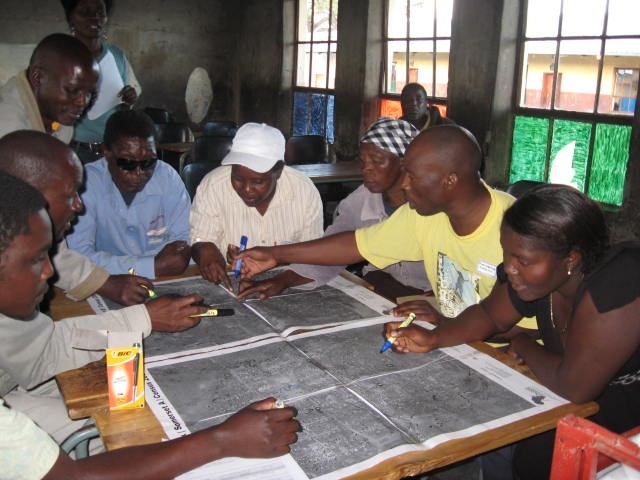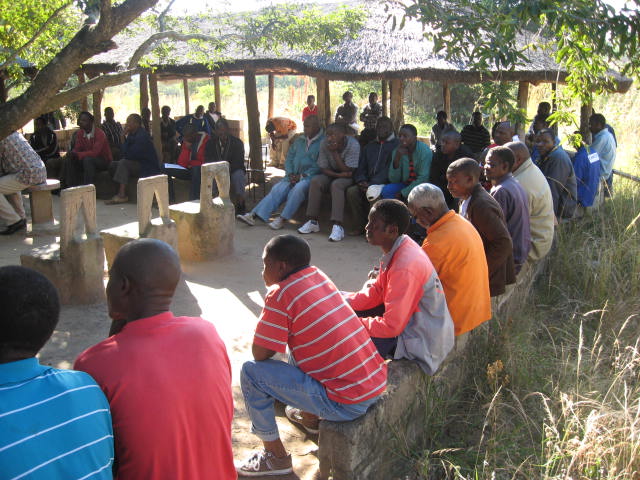The MRC/Wits-Agincourt Unit has enjoyed the support of its host communities for over 30 years. Longitudinal community-based surveillance work rests on stable long-term relationships which need to be nurtured and fostered.
For our Public Engagement Office to be effective it must develop constructive relationships with:
- The community and general public
- Service providers
- Researchers
- Fieldworkers
- Data analyst
- Administration
- Research office
-

MISSION: To be an effective Public Engagement Office, working together with the public, service providers, researchers, fieldworkers, data section, administration section, and research office enables effective and appropriate community engagement with research.
Primary relationships are between the Unit’s Public Engagement Office, the elected village Community Development Forums, and the indunas of the 28 villages in the study site. The real public face of the Unit is its field workers, who are trained to ensure that they are able to conduct informed consent and answer questions from potential participants with sensitivity
HOW DOES COMMUNITY GOVERNANCE WORK IN THE AGINCOURT HDSS STUDY AREA?
The field site covers 28 administrative villages in the Bushbuckridge sub-district of the Ehlanzeni District of the Mpumalanga Province of South Africa. Administrative villages are defined by the municipality and the traditional authorities. For more information about why the number of villages has changed over the years, download this poster on why it’s so hard to answer the question of how many villages are there in the study site. 13 of these villages fall under the Amashangana Traditional Council, 14 under the Jongilanga Traditional Council, and one under the Hoxane Traditional Council. Although the political power of the traditional councils has decreased considerably since 1994, they are still respected leaders in the community and are consulted on most matters affecting development.
ROLE OF THE PUBLIC ENGAGEMENT OFFICE
All CDF, Indunas, Ward Councillors and Local Municipal Officers in the field site are well known to our Public Engagement Office Team.
- The Team and village leadership enjoy a good working relationship.
- When required the PEO meets the CDF, either at regular or special meetings
- Bi-annual meetings involving the CDF’s, Indunas, Community Advisory Board members and Community Development Workers are held at the Agincourt offices
- Meetings can be called involving the entire Traditional Council when Indunas hold their joint meeting.
- The Team and village leadership enjoy a good working relationship.
- When required the PEO meets the CDF, either at regular or special meetings
- Bi-annual meetings involving the CDF’s, Indunas, Community Advisory Board members and Community Development Workers are held at the Agincourt offices
- Meetings can be called involving the entire Traditional Council when Indunas hold their joint meeting.
- The Team and village leadership enjoy a good working relationship.
- When required the PEO meets the CDF, either at regular or special meetings
- Bi-annual meetings involving the CDF’s, Indunas, Community Advisory Board members and Community Development Workers are held at the Agincourt offices
- Meetings can be called involving the entire Traditional Council when Indunas hold their joint meeting.
- Advise on community entry
- Running community entry (after ethics approval)
- Community, local, district and provincial service provider feedback
- Assistance with dealing with ethics of practice issues arising during fieldwork
- Report on community entry and feedback

Our field site covers 28 administrative villages in the Bushbuckridge sub-district of the Ehlanzeni District of the South African Mpumalanga Province. The municipality and the traditional authorities define administrative villages. Villages are arranged as follows in terms of the respective traditional authorities:
Our field site covers 28 administrative villages in the Bushbuckridge sub-district of the Ehlanzeni District of the South African Mpumalanga Province. The municipality and the traditional authorities define administrative villages. Villages are arranged as follows in terms of the respective traditional authorities:
While the political power of the Traditional Council, decreased after 1994, they remain respected leaders in the community and are consulted on most matters affecting development.
LOCAL GOVERNANCE
- Comprises three levels: Municipal, Ward, and Community Development Forum (CDF)
- Prior to recognition CDF’s must adhere to government regulations on gender and disability representation
- 8 Municipal Wards represented in the Agincourt study area
- Each has a Ward Councillor, accountable to the Municipal offices and the CDF
- Each village CDF comprises:
- two representatives per Community Based Organisation (CBO), and
- the Induna (Chief) as a representative of the Traditional Council
- Paid Ward Councillors are elected, one from approximately five villages – two years after the country’s national elections
- The Councillors and Ward Council represent village concerns to the municipality.
Indunas of each village meet weekly at their Traditional Council offices

PEO INTERACTION WITH PUBLIC SERVICE PROVIDERS AND POLICY IMPLEMENTERS
Routine interaction includes:
- Informing village leaders and members of census updates and research projects
- Prepared feedback
- Discussion of research findings at village meetings
- Briefing village leaders
- Production of village fact sheets in support of local development initiatives
- Providing household factsheets, part of annual updates
- Providing research project fact sheets
- Translating fact sheets timeously
BENEFITS OF THE PEO TO THE MRC/WITS-AGINCOURT UNIT
- Assisting in ensuring that socially responsible research occurs in the site
- Developing an effective research result feedback process on local, district and provincial levels
- Monitoring and evaluating the use of the data at these levels
- Ensuring that appropriate community entry is undertaken for all projects

There is a rigorous ethics clearance process that must be followed and facilitated by the PEO
Research Projects are approved by:
- Wits Ethics Research Committee on Human subjects
- The Mpumalanga Province health Department Ethics Committee
- Consent forms used in each project
- Reason for the research
- Real and potential benefits to the community
- Informed consent: verbal or written
- Field workers trained in implementing informed consent prior to each project
- For research projects request formal permission from CDF, Indunas, and affected village communities
- The research will be presented at a community meeting. Research question(s) and methodology explained, and community questions addressed
